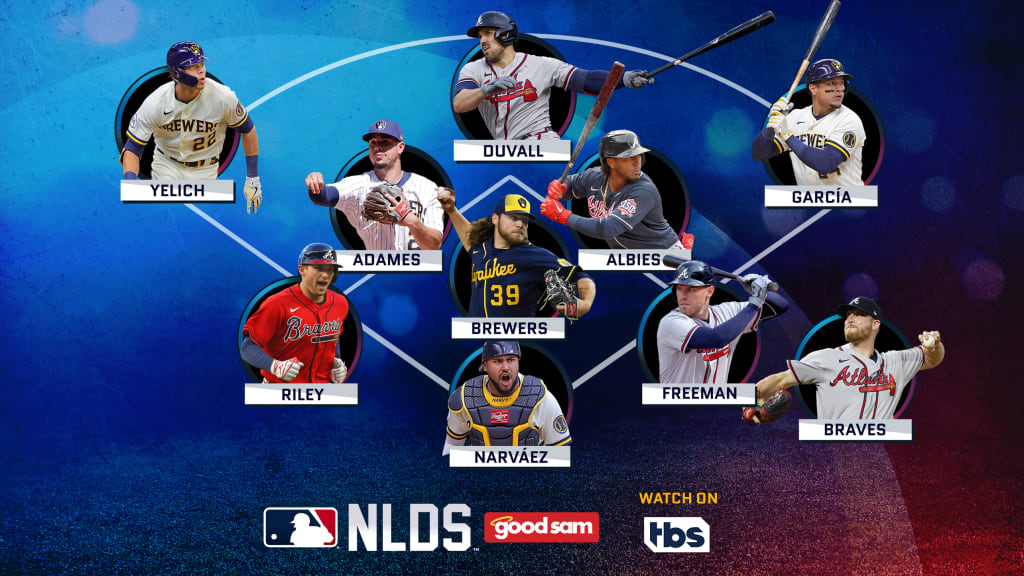
The National League Division Series will match up Milwaukee¡¯s current and former franchises, as the NL Central-champion Brewers take on the NL East-winning Braves.
The last time the Braves played a postseason game in Milwaukee was Game 7 of the 1958 World Series at County Stadium, mere feet from the site on which the Brewers' current home, American Family Field, now stands.
Both of these teams have been part of the playoff mix in each of the past four years, with Atlanta winning four straight NL East titles and Milwaukee finishing first in the NL Central twice in that span.
Before the NLDS gets underway on Friday, here¡¯s a look at how these two clubs stack up against each other, position by position.
Catcher
A year ago, this would have been a significant advantage for the Braves, with Travis d'Arnaud posting a .919 OPS compared to .562 for Omar Narváez. Although Narv¨¢ez outperformed d¡¯Arnaud overall in 2021, recording a .743 OPS to d¡¯Arnaud¡¯s .671, the Braves' catcher had a .720-.592 second-half edge. On the defensive end, Narv¨¢ez¡¯s 10 runs saved from extra strikes gained from pitching framing leads MLB. He converted 49.3% of non-swing pitches into called strikes in the shadow zone, the 15th-best rate in the Majors, while d¡¯Arnaud tied for 41st (47.1%). This one¡¯s close, but we¡¯ll give a slight edge to the Brewers' backstop.
Advantage: Brewers
First base
Milwaukee has been trying to figure out first base all season. Keston Hiura began the year as the Brewers¡¯ starting first baseman, but he struggled in the first half and barely played in the Majors after the All-Star break. Hiura, Daniel Vogelbach, Rowdy Tellez, Jace Peterson and Eduardo Escobar all made at least 15 appearances at first base for the Brewers, and the team¡¯s .716 OPS at the position ranked 25th in the Majors. On the contrary, the Braves haven¡¯t had to worry about first base for more than a decade with Freddie Freeman manning the position. The reigning NL MVP turned in another excellent season, appearing in 159 games and slashing .300/.393/.503 with 31 homers, 83 RBIs and an NL-leading 120 runs scored.
Big advantage: Braves
Second base
From a rate-stats perspective, Ozzie Albies and Kolten Wong were actually quite similar this season. Albies posted a .799 OPS, while Wong had a .783 OPS. But Albies had a massive counting-stats advantage over Wong. Albies, 24, became the fourth second basemen in AL/NL history to produce 30-plus homers, 20-plus steals and 100-plus RBIs in a single season, joining Hall of Famer Ryne Sandberg, Alfonso Soriano (twice) and Javier B¨¢ez. And while Wong is a better defender, Albies is solid enough with the glove to hold off the Brewers' second baseman here.
Advantage: Braves
Shortstop
When the Brewers acquired Willy Adames from the Rays on May 21, they were 21-23 and ranked 28th in the NL in OPS overall and 26th in OPS among shortstops. After Adames joined the team¡¯s lineup on May 22, Milwaukee went 74-44, and Adames led the club in average (.285), on-base percentage (.366) and slugging (.521). Braves shortstop Dansby Swanson set career highs in homers, RBIs, runs and games played this season, but it¡¯s not enough to overcome the impact Adames has made for the Brewers.
Advantage: Brewers
Third base
Luis Urías has established himself as a viable starter for Milwaukee, recording 23 homers with a .789 OPS while splitting time between third, shortstop and second, and the Brewers also could use Escobar at the hot corner, but Austin Riley has the edge here. Riley was especially impressive after the All-Star break, hitting .333 with 19 homers, 65 RBIs and a .976 OPS to help the Braves go from a postseason long shot to NL East champions without superstar Ronald Acuna Jr., who suffered a season-ending ACL tear in July. The 24-year-old Riley reached the 30-homer and 100-RBI plateaus for the first time in his career while recording an .898 OPS.
Advantage: Braves
Left field
Acquired from Cleveland prior to the Trade Deadline, Eddie Rosario has given the Braves a jolt (.903 OPS) in left field since he returned from the injured list in late August. Christian Yelich, meanwhile, finished up a rough regular season with a whimper, producing one home run with a .620 OPS in his final 27 games. Over the past two years, Yelich produced 21 home runs with a .752 OPS over 175 games. However, we¡¯ll still give the nod to Yelich for his larger body of work, which includes an NL MVP Award and 80 homers with a 1.046 OPS across 2018-19.
Advantage: Brewers
Center field
Since Rosario joined Atlanta¡¯s lineup, the club has been giving regular starts to Adam Duvall in center field. Although he¡¯s nowhere near the defender Brewers center fielder Lorenzo Cain is, Duvall has held his own at the position this season, recording 2 outs above average (5 across all positions). On offense, Duvall doesn¡¯t reach base often (.281 OBP), which limits his ceiling, but he sure can slug. The 33-year-old ranked second in the NL in homers with 38 and led the league with 113 RBIs.
Advantage: Braves
Right field
Jorge Soler has been a great addition for the Braves, and the team even has been using the former AL home run champion as its leadoff hitter lately. But the lack of the designated hitter in the NL means the slow-footed Soler has had to play defense every day. We¡¯ll give the edge to Milwaukee¡¯s Avisaíl García, who is a capable defender in right and has been a productive hitter for the Brewers all year, registering a career-high 29 homers and 86 RBIs with an .820 OPS.
Advantage: Brewers
Rotation
The Braves have an outstanding rotation trio of Charlie Morton, Max Fried and Ian Anderson, but the Brewers¡¯ rotation is on another level. Led by Corbin Burnes, Brandon Woodruff and Freddy Peralta, Milwaukee¡¯s starting staff recorded the second-best ERA (3.13) and the third-most strikeouts (906) in the Majors this season. Burnes arguably has been the single most dominant starter in the game, leading MLB in ERA (2.43), FIP (1.63) and strikeout rate (35.6%). The Brewers will also have a significant advantage in the fourth-starter matchup, regardless of whether they choose Eric Lauer or Adrian Houser.
Advantage: Brewers
Bullpen
The Brewers¡¯ bullpen took a big hit when Devin Williams suffered a fractured right hand after the team clinched the NL Central. The loss of Williams is enough to tilt this battle in favor of the Braves. Milwaukee still has its share of capable relievers led by Josh Hader, Jake Cousins, Brad Boxberger, Brent Suter and Aaron Ashby, but Atlanta can counter with Will Smith, Tyler Matzek, Luke Jackson, A.J. Minter, Richard Rodriguez and Jesse Chavez.
Slight advantage: Braves
Prediction: A 5-5 position split suggests this should be a close series that could go down to the wire. Milwaukee¡¯s starting pitching could be the difference, with the Braves likely to have trouble scratching out three wins in five games when they have to face Burnes twice and Woodruff, Peralta and either Lauer or Houser once each.

